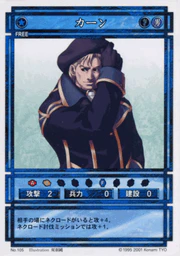Unique Rule: Difference between revisions
More actions
No edit summary |
|||
| (8 intermediate revisions by the same user not shown) | |||
| Line 1: | Line 1: | ||
The '''Unique Rule''' (ユ二ークのルール, ''Yunīku no Rūru'') is a rule in the [[Genso Suikoden Card Stories TCG]] that restricts the cards you can play. | |||
==Overview== | ==Overview== | ||
In its most basic form, the Unique Rule states that only a single [[ | [[File:Kahn_(CS_card_105).png|180px|thumb|left|Despite their different effects and attributes, this Kahn card...]] | ||
In its most basic form, the Unique Rule states that only a single [[character card]] of a name can be deployed at any one time by either player. It represents the idea that each character is a unique individual in the world. | |||
Each player cannot deploy a character card of the same name, nor can a single player play two cards of the same name. This does not restrict the [[deck]], which can contain any number of cards of the same name (Genso Suikoden Card Stories TCG)/4 cards of the same name (Genso Suikoden Card Stories TCG Chapter II), merely what can be played on the field. | |||
The rule | The rule encompasses different numbered cards with the same name. So a later edition card cannot be played alongside an earlier release of the same card, even if their attributes and abilities differ. It also applies to cards with multiple names in them. For example, there cannot be a McDohl & Germio card and a McDohl card, or a Gremio card, on the [[game field]] simultaneously. | ||
The [[ | [[File:Kahn (CS card CS2-203).png|180px|thumb|right|...and this cannot both be deployed due to the Unique Rule]] | ||
The rule also applies to [[Mastermind card|Mastermind cards]]. You may not have a Mastermind card and a regular Character card of the same name in play. If your opponent plays a Mastermind card, you cannot play a Character card of the same name either. | |||
If a card that would break the Unique Rule is deployed by an effect, it is immediately discarded. The Unique Rule does not apply to [[mission card]]s or [[facilities card]]s as they are not character cards. | |||
[[Category: | The [[Card text abbreviations|Betrayal conditional]] takes advantage of the Unique Rule by replacing a character card with the Betrayal conditional your opponent has on the field with the version you played, forcing the original card to be discarded. | ||
==References== | |||
# [[Genso Suikoden Card Stories Official Rule Book 1st Edition]], page 14 | |||
{{Navbox CS}} {{Short description|Genso Suikoden Card Stories game mechanic}} | |||
[[Category:Genso Suikoden Card Stories rules and terminology]] | |||
Latest revision as of 15:47, 12 November 2025
The Unique Rule (ユ二ークのルール, Yunīku no Rūru) is a rule in the Genso Suikoden Card Stories TCG that restricts the cards you can play.
Overview

In its most basic form, the Unique Rule states that only a single character card of a name can be deployed at any one time by either player. It represents the idea that each character is a unique individual in the world.
Each player cannot deploy a character card of the same name, nor can a single player play two cards of the same name. This does not restrict the deck, which can contain any number of cards of the same name (Genso Suikoden Card Stories TCG)/4 cards of the same name (Genso Suikoden Card Stories TCG Chapter II), merely what can be played on the field.
The rule encompasses different numbered cards with the same name. So a later edition card cannot be played alongside an earlier release of the same card, even if their attributes and abilities differ. It also applies to cards with multiple names in them. For example, there cannot be a McDohl & Germio card and a McDohl card, or a Gremio card, on the game field simultaneously.

The rule also applies to Mastermind cards. You may not have a Mastermind card and a regular Character card of the same name in play. If your opponent plays a Mastermind card, you cannot play a Character card of the same name either.
If a card that would break the Unique Rule is deployed by an effect, it is immediately discarded. The Unique Rule does not apply to mission cards or facilities cards as they are not character cards.
The Betrayal conditional takes advantage of the Unique Rule by replacing a character card with the Betrayal conditional your opponent has on the field with the version you played, forcing the original card to be discarded.
